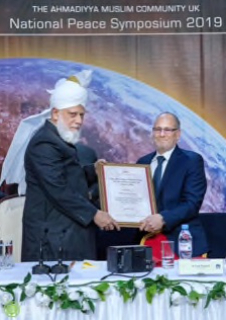Campus News
Bridging the educational divide on a global scale
Alumnus Fred Mednick, founder of two-time Peace Prize–winning NGO Teachers Without Borders, has worked to expand worldwide educational access for over two decades.


At about 85 million, teachers are one of the largest groups of trained professionals in the world. Yet students’ access to education is exceedingly disproportionate on an international level.
UC Santa Cruz alumnus and trailblazer for social change Fred Mednick (Stevenson ’76, literature) founded the world-renowned organization Teachers Without Borders in 2000 to combat the global educational divide by utilizing teachers as catalysts for change in 171 countries around the world.
“Teachers have always been—and it is their very nature to be—true catalysts of change, the acupuncture points of our society, and the glue that holds our world together,” Mednick says.
An educator himself, Mednick is currently a professor of education sciences at Vrije Universiteit Brussel in Belgium while working remotely from his home in Seattle.
After earning his undergraduate education at UC Santa Cruz, Mednick received his M.A. in education from Claremont University in 1982 and then his doctorate in comparative education at Seattle University in 1999.
Mednick looks back at his time at UC Santa Cruz as a pivotal moment in affirming the connection between higher education and social change throughout his educational endeavors.
“UCSC trusted me to reflect not only upon what I was learning, but how I could translate learning into social change,” he says. “UCSC helped me understand that I could shape a path. I must say how important that is, because prior to attending the university, I wasn’t certain I could.”
Shaping paths for students worldwide
Teachers Without Borders offers many developmental programs and courses for both teachers and students, including peace education programs, education in emergencies programs, and girls’ education courses.
Raised in a feminist household and a father of two daughters, Mednick recognized the inequities in educational opportunities for women and girls worldwide and the importance of bridging that divide.
“It’s more than just reaching a minimum standard,” Mednick says. “The world needs feminist leaders who are scholars as well as practitioners.”
The United Nations Educational, Scientific, and Cultural Organization estimates that 129 million girls are out of school, and only 49 percent of countries have achieved gender parity in primary education worldwide.
“I can go on and on about the importance of girls’ education for the world,” Mednick says. “Educated girls are 50% more likely to immunize their children in the future and with an extra year of education, a girl can earn up to 20% more as an adult. A child born to a literate mother is 50% more likely to survive past the age of 5.”
Teachers Without Borders works directly with international NGOs and civil society organizations that focus on re-enrollment programs, anti-early-marriage campaigns, and the prevention of human trafficking. In addition, Teachers Without Borders provides free courses for teachers, with an emphasis on the before, during, and after of education in emergencies.
Mednick says his organization has substantially impacted girls’ education in Nigeria, Pakistan, Afghanistan, Tajikistan, South Africa, Rwanda, Burundi, China, India, Haiti, Suriname, and Mexico.
Teachers Without Borders’s efforts in girls’ education in Afghanistan were significantly impacted by the Taliban’s takeover of most of the country’s borders in August 2021, threatening women and girls’ rights and educational opportunities.
“The whole thing breaks my heart,” Mednick says. “Women’s organizations and NGOs serving girls’ and women’s education are under assault. But even then, there are extraordinary efforts afoot.”
Mednick says Teachers Without Borders continues to support efforts in Afghanistan through two initiatives focused on girls’ education but would not get into specifics given the sensitivity of the situation in the country.
“It’s hard to know exactly what is going on there, and though we receive anecdotal information, we have to tread carefully,” Mednick says. “Afghanistan may be out of the headlines now, but I refuse to forget. No one should.”
Education, peace, and social change
Since its inception over two decades ago, Teachers Without Borders has received 15 awards and recognitions, including two Peace Prizes in 2018: The Luxembourg Peace Prize for efforts in peace-building through teacher professional development and the Ahmadiyya-Muslim Prize for the Advancement of Peace.
Mednick credits the 2018 Ahmadiyya-Muslim Prize for the Advancement of Peace to teachers in Pakistan, Israel, Palestine, India, Rwanda, Burundi, Mexico, and Kenya. He says teachers in those countries emphasized peace in one’s home, peace in the classroom, and peace in one’s community.
For current UC Santa Cruz students seeking social justice and change in their communities, Mednick offers some advice: “Please don’t let the fervency of your mission cloud your message.
“Social justice is not a clean, unencumbered path riding on fixed rails,” he says. “It is more often than not one step forward and two steps back. Do not rush to fix the injustices you see with magic solutions. Pay attention. You have two ears and one mouth, and they should be used in that proportion.”
Mednick finished his most recent book; I Want to Meet the King of America: Encounters with Remarkable Teachers and the Power of Human Agency, highlighting the past 20 years of Teachers Without Borders. All proceeds from the book will be donated to the Jane Goodall Institute. Goodall is a partner with Teachers Without Borders and a close friend of Mednick’s.